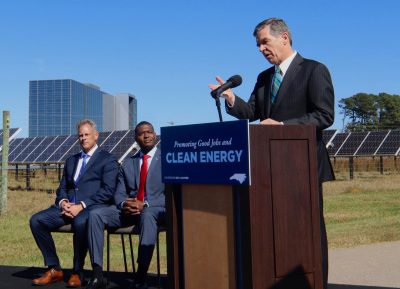From a North Carolina Health News report by Greg Barnes.

RALEIGH — Roy Cooper recently gave cabinet secretaries their marching orders to fulfill his executive order calling for a 40 percent reduction in the state’s greenhouse gas emissions by 2025.
Supporter Spotlight
Speaking to a packed house Dec. 19 in a conference room at the Nature Research Center in the North Carolina Museum of Natural Sciences, Cooper noted the progress that has been made to reduce pollution in the state. But he said efforts for a cleaner, healthier North Carolina have stalled.
“Since 2011, we have not made the kind of progress that we need to make,” Cooper said. “It is now time to step up, bring all of state government together, our business community, our environmental community, and to make sure North Carolina is a leader in fighting climate change.”
The North Carolina Climate Change Interagency Council, made up of cabinet secretaries or their representatives, met for the first time to discuss Cooper’s executive order and begin mapping out strategies.
Headed by Michael Regan, secretary of the state Department of Environmental Quality, the council is tasked with reducing statewide greenhouse gas emissions by 40 percent below 2005 levels, increasing the number of zero-emission vehicles from 9,000 to at least 80,000, and reducing energy consumption in state-owned buildings by 40 percent.
“Executive Order 80 initiates the largest mobilization of clean energy resources and strategies in our state’s history,” Regan said at the beginning of the meeting. “From using zero-emission vehicles to tasking all of us with the development of a state clean energy plan, this council was created to recommend the best ideas to meaningfully address our changing climate while keeping North Carolina safe, healthy and globally competitive.”
Supporter Spotlight
As part of the order, DEQ will develop a North Carolina Clean Energy Plan to encourage the use of renewable energy, including wind and solar power. The Department of Commerce will support the expansion of clean energy businesses and service providers, clean technology investment and companies with a commitment to procuring renewable energy.
But getting his priorities addressed could be a challenge for Cooper. During the 2017 legislative session, General Assembly lawmakers placed a moratorium on wind farm development that will end at the end of this month. Critics argued that the moratorium slowed development of the power source. To move forward on more solar and wind power will likely need the legislature’s approval.
Already Feeling Effects?
Cooper said people don’t have to look far to see the devastating effects of climate change. He noted three so-called 500-year storms in the last 19 years, the last two — Hurricanes Matthew and Florence — coming within 23 months of each other.
Susi Hamilton, secretary of the state Department of Natural and Cultural Resources, said climate change may be to blame for a 7,000-acre forest fire near Chimney Rock State Park and continual flooding in the parking lot for the Battleship North Carolina memorial.
Cabinet secretaries said they will develop strategies to combat climate change in the state. They also said their departments will do their part to conserve energy in buildings and use more zero-emission vehicles.
The council plans to meet six more times between now and November, spreading the meetings out to various parts of the state to give people the opportunity to be heard.
Jeremy Tarr, Cooper’s policy adviser on energy, the environment, transportation and natural resources, called the schedule to develop a clean energy plan aggressive.
What other states are doing in two years, North Carolina will do in about six months, he said.
About a dozen people, many from activist groups and nonprofit organizations, spoke to the council at the end of the meeting. Most commended Cooper’s order but urged him to go further by putting an end to construction on the Atlantic Coast Pipeline, hydraulic fracturing of underground rocks to release natural gas (known as fracking), and the use of fossil fuels.
Lib Hutchby of Orange County asked people in the audience to stand if they are grandparents, then she and others in her group presented the council with a book, “The Lorax” by Dr. Seuss, a children’s story about respecting the environment.
Cathy Holt, an environmental activist from Asheville, commended the council but asked how DEQ is going to play such a consequential role in the plans when its budget has been slashed and it is struggling to meet existing needs.
Learn More
This story is provided courtesy of North Carolina Health News, a website covering health and environmental news in North Carolina. Coastal Review Online is partnering with North Carolina Health News to provide readers with more environmental and lifestyle stories of interest about our coast.







